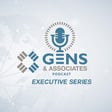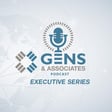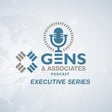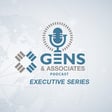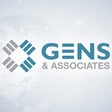Become a Creator today!Start creating today - Share your story with the world!
Start for free
00:00:00
00:00:01

Service Provider Executive Series Episode #6 - Frank D'Entrone (FME Life Sciences)
In Today's episode, host Steve Gens is joined by Frank D'Entrone (Head of Global Sales at FME Life Sciences). Together, they discuss Regulatory Modernization and Transformation best practices, AI enabled services, and what to expect from FME in the coming years!
Transcript
Introduction to the Podcast and Guest
00:00:00
Speaker
Welcome to the Gens & Associates Regulatory Executive Podcast Series. I'm Steve Gens, your host, and today's guest is Frank D. Enthrone from FME.
00:00:11
Speaker
So Frank, we've known each other for quite a while. And certainly I've watched FME you know grow over the years to become the leading. And it's through our benchmark data, data migration services provider. And certainly when clients ask us who are about to go through their modernization or maybe a a big system process change, who should we think about FMEs always on the top of our list? So it's great to have you here today.
Frank Dentrone's Background and FME's Growth
00:00:41
Speaker
And what I would like to ask you to do before we get started is just introduce yourself to our listeners, quick background of yourself and FME, and then we'll get started. Great. Yeah, Steve, thanks a lot. yeah I appreciate you having FME participate in in this podcast. This is a you know great opportunity to ah for me to share our experiences. So let me do a little background about myself. So as you said, Frank Dentrone, president and head of business development in North America for FME.
00:01:12
Speaker
a little more substance around my background. So I've been working in life sciences industry since the late 90s, so some time now. um Historically, you know, my background is historically through through the lens of of a delivery, you know, functions. So very technical, you know, early on in my career.
00:01:31
Speaker
And actually, most of that experience has been in in the regulatory space, so quite good for for this type of you know discussion we're having today. And um yeah I do have some experience outside of of the regulated industries, outside of life sciences, um you know that helped you know form a lot of my my experiences that I bring to to our life sciences clients.
FME's History and Industry Role
00:01:52
Speaker
A little more about FME in particular. So, you know, FME, you know, we provide digital transformation services, as you had mentioned, you know, in your intro heavily in the, you know, and data and document migration space. So we're well-known and in that area, as you mentioned. ah We're founded back in the mid-90s in Germany. So our heritage, you know, German heritage, that's our our or parent company.
00:02:22
Speaker
And we've grown over the years organically. um So a little bit fast forward, you know where where I come in. ah So I've worked a lot in Europe over the years and earlier in my career. And I actually crossed paths with FME in my my ventures in in Europe, working with clients. And we actually did a ah joint venture together. So we founded FME here and in North America and in 2010. So yeah we've been operating in the North American market since then. and um Yeah, again, with a strong focus in the in their life sciences space and really delivering you know enterprise solutions, particularly like I mentioned around data and documents. A lot in regulatory, but we also have experience and and penetration in the clinical and quality area.
00:03:09
Speaker
Yeah, that's good to know um as far as the clinical and quality because, you know, certainly we've been tracking you guys on the other regulatory space. And, um you know, the one thing that that stands out for me, um I didn't realize it was the mid 90s when FME was founded.
00:03:26
Speaker
But since I think it's about 2020, 2005, 2006, that's when we had our first official study, you know, regulatory. And we've always been tracking the software and service providers. And you've seen a bunch or the majority come and go and a lot of new ones over the last seven, eight years. But that's something I'm sure you guys are really proud of, you know, 30 years, you know, kind of ah in the making.
Impact of Data Quality on System Transformations
00:03:52
Speaker
That's very impressive.
00:03:53
Speaker
So why don't we start, because what I wanted to dig into, you know being in the leadership position you are, you've probably seen it all. You work with many or most of the top companies, mid-tier, small, as they're doing. yeah We use the term modernization. A lot of companies call that transformation, but they're consolidating systems. You're simplifying, you're standardizing out processes, you know trying to get rid of complexity. That's kind of how we view it.
00:04:22
Speaker
And we usually, when we tell our ah clients or people that say, you know, like, who should we use? Who should be on the ah RFP? The other thing we always counsel is with them is it's really data remediation and then the migration. Usually whatever you think your budget should be is double it and it takes longer.
00:04:43
Speaker
So you've probably seen areas where clients have very clean data, and it's pretty straightforward, and you've probably seen some some really complex situations. So maybe what you could provide our ah ah listeners is some of the examples, how the FME team kind of supports these, you know, monetizations or transformations, and maybe share what you consider are some of the leading practices. Sure, yeah. I mean, we, um We do work in large many of the large enterprise accounts, so some of the you know top 10, top 20. That's where I spend a lot of my time. um But we also have clients in, you know like you mentioned, mid-market or even the the smaller, the SMB area. And we adapt ourselves to those different types of clients. you know there's different They're in different air and maturity curves, if you will, or in a different phase of their journey. So as we come into the picture, you know we
00:05:40
Speaker
We bring that that experience around, hey, you know we've done this type of migrations with similar ah size and scale that that year you know for that particular client. So we try to write size and and educate you know at the right levels, you know depending on the client and their needs. But as you said, you know the data, it's all about the data. right And um the quality of that data is really going to influence one way or the other.
00:06:08
Speaker
you know time and then I would say even success, you know levels of success because it's all about the data. So we we tend to come and bring our best practice in and do sort of a data a data assessment. So in terms of our best practice, we the first thing we would do is come in, get the lay of the land, you know do a data assessment, um so sort of like a phase zero is what we call it here at FME and really just a set expectations and and level set with with that with that client saying, okay, this is where your data sits, you know, depending on where they're going, you know, we would always look at it through where they are today and where they're going, right? So that assessment brings clarity to, you know, how much time is needed, right? What level of remediation is required? You know, what sort of human intervention or, which we'll probably talk about a little bit in this in this session today around automation and
00:07:04
Speaker
bringing other tools and techniques to to help you know get through that data remediation in terms of larger volumes with the least amount of human intervention possible. So those are just some some areas and examples that you know that come right off the top of my mind. And um yeah know so I'll pause there and ah you might have a ah question you know around the you know what I shared with you just now.
00:07:28
Speaker
Yeah, just more more of a comment, because you know another way how we counsel our you know kind of our members or you know kind of clients on the industry side is kind of what you said.
00:07:39
Speaker
that you know if you're you know they they they They either know the the quality of their data, or when you go through this, it's really a learning exercise. you know to like ah We thought it was pretty good.
00:07:52
Speaker
But maybe it's moderate you know at best. And then there's different fields between the different you know software providers that add complexity, terminology, et cetera, et cetera. But you know we we tend to say, OK, if you do this, they'll you know whoever it is, you know we'll do a phase zero. Then you have more of an accurate. But why don't you hire somebody to do, or hire FMA in this case, to do that phase zero before you're you know, kind of about do your final business case and getting all your costs as you go up the ladder to how many millions of dollars you're going to spend. Because, you know, what we've seen and I don't know if this is still true, Frank, you know, is, you know, educating ah people about, you know, the cost of bad data quality. So, if you know, you do a phase zero assessment.
00:08:44
Speaker
And I encourage people to think about is data remediation and um you know and migration. So do you have clients? I'm just kind of curious that you know outside of these massive, their joint process work, system work, that might do that phase zero upfront. So they really, really understand the cost, the effort, the time, the type of subject matter experts they're going to need on you know on the ah sponsor side. Do you see that or is that usually packaged together?
00:09:12
Speaker
um And we we tend to, we're starting to see a little more, maybe some of the messaging that, you know, I'll say FME is bringing out to the marketplace that, you know, it might be sinking in. So we do see some of it, um but we tend to see in some of the larger accounts, you know, there'll be like an ah RFP and we're always, you know, but sharing with, you know, that client in that in the ah RFP process, the the things we just spoke about, right? So these are the, you know, the 10 to one,
00:09:40
Speaker
you know, what's this whole thing at a cost? And, you know, we we give them, you know, orders of magnitude or, or or ah you know, rough idea, but we do always caveat that saying, hey, you know, we really need to get in and do sort of the data quality of that phase zero. And then we said, based on experience, you know, depending on the quality of the data, you know, we think this, this engagement will be about this long, you know, based on this data quality level. And then we just, we we go in and we verify, you know,
00:10:07
Speaker
ah go The going assumption is we think your data quality is at this level, but the outcome of phase zero will either reinforce our assumption or we'll readjust and and set
AI in Data Migration at FME
00:10:18
Speaker
expectations. But it's know going into that and you know that implementation and migration, you know eyes wide open, right? So everyone's clear on you know what's what's ahead of us.
00:10:28
Speaker
Yeah, and that kind of brings me back, you know even though we're still talking about IDMP these days, back in 2015, where everybody was, hey, it's it's yeah we're going to have to be live in a you know couple of years, because we, again, as associates, were you know involved in a bunch of those. And you know on the assessment, we didn't assess the data quality, but it's something they they had to do. And it was interesting in our benchmark data, because the average um data quality levels of, say, the registration management system or module or vault whatever you want to call it um um was higher the previous cycle then it did dramatically you know and that was during the time everybody was doing the readiness assessments and like how good is our data so I think that was the first like major wake-up call that maybe your data just isn't
00:11:17
Speaker
as good as you thought. But let's move on to, um it's been interesting in these podcasts, especially as we're talking with the ah software providers, it's a different conversation on AI automation. You know, what are they trying to do? But often,
00:11:33
Speaker
And I'm just getting a better handle on this personally over the six months. And I still don't think I have an answer or perspective that you know the AI automation impact for services companies, you know is it going to be you incremental or rather dramatic?
00:11:49
Speaker
um So it's it's really interesting time, especially, you know, if you're an outsourcer. So, you know, as a service provider with what you guys do, I'm kind of really curious because you have toolkits, you know, because the better and and the more you can automate or have tools that get that accuracy, like you said, much, much higher, you know, the better off the client situation is, you know, the higher chance from success versus a lot of brute force.
00:12:14
Speaker
you know, kind of conversions like it was 15 years ago, right? Yeah. So could you talk a little bit about that as far as you know, this AI automation focus with industry and let's not forget the health authorities. um There's probably you know, what is the impact from FME and then I think the bigger you know area of interest is what have you been doing with your services or say AI enabled you know toolkit ah that's going to really benefit your ah clients today and potential clients in the future? Yeah, no, a great question. And you know AI, it's it's all over the place. It's been emerging and it's it's more now than ever, um the whole the whole AI market in general. but
00:12:59
Speaker
what is that What does that mean for us and here at FME? So we do have and have historically applied techniques. you know There's tools and techniques that not may not necessarily require a full-on AI natural you know language processing, you know machine learning, but AI style techniques. we' We've been doing that for some time now. And what what that means is you know there's there's ways to take data that they have today and align it, right? So where you have, you know, certain breadcrumbs of information, but it needs to be, as we said, remediated or aligned to, you know, a future state standard. And so we have a series of scripts and techniques and tools, you know, AI type driven tools that help us bring that tape that capability into our migration
00:13:49
Speaker
services portfolio. And as you mentioned, I think you mentioned, I'll bring it up here is, you know, we have a product called migration center. It's been out there for like 20 years. ah We've been using that tool for fruits for decades now. And that has its own type of, you know, regular expression capabilities, as well as some of like the things I mentioned techniques that we're bringing to to help align data. Because, like you I think you said, like re for REM, for example,
00:14:18
Speaker
registration systems, you know, there's a whole bunch of things that we were on the ground, like living and breathing now, where we're aligning data to to ah certain standard data standards that the regulators are are
Evolution of Data Migration Tools
00:14:30
Speaker
enforcing. So those are just some examples. I mean, we're also investing in traditional, you know, AI, you know, natural language processing tools. um We're looking at, you know, certain services that are available to us through AWS and other hypervisor, you know, cloud providers, um where we have capabilities already where we could tie into that. um So those are just some examples. But AI is a is a major, we have a lot of investments at the moment, and
00:14:59
Speaker
in AI and exceler you know and improving our existing accelerators by adding some of these AI you know techniques and and capabilities. Yeah, and I would imagine, it and maybe I'm going to misrepresent this, Frank, so please correct me if I tell that.
00:15:17
Speaker
You know, kind of the the analogy, because there's only a finite set of software providers. And that's kind of pick on the registration or, you know, you might have some companies that, you know, they're still data, say, at the national level. It's not in the the central system, but it's in some somewhere locally, spreadsheets, SharePoint, or maybe a local system those you know tend to be nuances and it goes you know to another software providers you know we won't list them out you know here but it's a finite you know set so like ah the whole large language models it's all about the model learning I'm sure you have that same thing in the migration center where
00:15:58
Speaker
It's learning over time, sees a lot of the nuances. So after a while, you know, they're no longer nuances. It's something, you know, that your migration center is looking for and actually can map over. So ah please correct me um if that's that's kind of a wrong analogy or or spot on.
00:16:17
Speaker
Yeah, no, that that's a reasonable analogy. And yeah, as over the years, you know, the tooling is getting smarter and smarter. I wouldn't say it's perfect, but it's learning, you know, over different types of engagements, right. So we're applying or enhancing the toolset, you know, as as we learn, you know, as an organization,
00:16:37
Speaker
and what the industry is needing. so So I would say it's a reasonable analogy. We're also looking at it in terms of um yeah like the different providers, like different vendors that are out there, right? they When they're re-platforming, if a client is re-platforming or going from so a legacy or a legacy technology to a a new future state in their transformation, some of the remediation and some of that transformation actually is in the different models. So different vendors,
00:17:07
Speaker
treat registrations differently, right?
Challenges in Data Migration and Regulatory Standards
00:17:10
Speaker
So different levels of granularity. um So we bring that knowledge, right? So depending on where they're coming from and where they're going, we go, okay, this the way you have it today is that this is the way it's modeled you know in your current system. And this is how that would look like in the new system and help bridge bridge that knowledge gap in terms of understanding so that that helps enable right us and the client to identified the level of transformation or the level of remediation, again, back to remediation, the level of changes that need to occur, whether it be systematic or through um other automation or or human intervention techniques, ah that's a big part of the the the transformation process as well. I just wanted to bring that you know to the to light here.
00:17:57
Speaker
Yeah, yeah, absolutely. And, you know, as you were talking, I wrote down here, there's nothing perfect about any migration. I don't think there's a perfect migration. It's kind of hard and complex. And, you know, back in my Johnson and Johnson days, when I was still kind of a quasi, you know, systems person, you know, I started in the financial area. So the best way to prove out the data is, you know, do your books tie, you have your general ledger chart of accounts, you know, so it's very tangible.
00:18:28
Speaker
versus, you know, kind of on the research side, the R and&D side, it's it's definitely a different ballgame on that. And like, if we look at kind of colleagues in the clinical area with the trial master file, wouldn't it be great? Because there's a set standard there for the TMF, right? Right. Right. So, boy, wouldn't that be a good thing for regulatory, you know? But we're we're a long ways off. You know, I know there's the RIM reference model and other things that are being worked on, but, you know, standards are a good thing.
FME's Future Investments and Strategic Partnerships
00:18:55
Speaker
so um So I think the last thing, um things are really moving quickly you know with AI. There's a lot of different health authority initiatives, you know still a select amount of you know companies that are you know doing their transformations. I think things are heating up in the med tech sector you know from the regulatory area. So I think it'd be good with our listeners, um what should industry expect from FME in the coming years, kind of near term and in longer term?
00:19:25
Speaker
Sure, yeah, i that's the great question. So you know what i what should be expected and what you should hear from us in in like throughout this year and and in the short term and and and for the future is you know really we're investing in industry leadership, thought leadership, continuing in regulatory, but also bringing that same level of of leadership and knowledge sharing in clinical and quality. So those those are things, you know, keep a lookout for us in that area in those areas. um You know, leveraging, you know, next-gen solutions, looking at, you know, what the market is producing, you know, we're we're keeping a close pulse to that, you know, what software providers are emerging, you know, who, where the the ones that are, you know, the lion's share today, but, you know, are there any, you know,
00:20:11
Speaker
next-generation solutions coming to to the to the market. So we're keeping a close eye on that. ah We're expanding, you know which was a big part of this discussion today, AI-driven you know capabilities in our portfolio. So continue to involve evolve and invest in that, in our migration particularly in our migration portfolio.
00:20:30
Speaker
looking at NLP and and machine learning capabilities and offering different models right depending on you know the types of data that we're migrating. So you know keep a lookout for that. Those are investment areas for sure. And really enhancing, you know from our point of view, data you know improper interoperability and staying close to the standards and and what the compliance requirements are coming, like you mentioned, IDMP. I mean, we've been involved in a few early, let's say, early adopters in the IDMP space, and we have a few running engagements right now that IDMP is a ah big part of the story. So,
00:21:06
Speaker
That's something that, again, we have good experience with. you know We're continuing to learn and adapt, um depending on you the client and their data and where they're going. So stay tuned more on on our IDMP capabilities. And really driving innovation through strategic partnerships, again, through AI providers, as well as you know, so other platform providers that we're partners with. So really leveraging those strategic partnerships, you know, continuing to invest and innovate those partners.
Conclusion and Future Engagements
00:21:35
Speaker
You know, those are just some examples of the things that come to mind that the market should, you know, keep an ear to the ground, you know, for FME. Yeah, thanks for that, for Frank. And certainly good luck on the other quality side. um I think, you you know, we did
00:21:51
Speaker
I kind of ventured into the quality space two and a half years ago. Catherine Yangayat, you know, led that study and we had to pull in different subject matter experts. And it just seems as like the bell curve of the ah the regulatory transformations was coming, not to an end, but slowing down, right? It's really heating up in quality. And the thing that I was amazed, you know, because you think about quality, okay? It's quality, the QMS.
00:22:16
Speaker
But what we found, I think we had like 27 companies in that and about half of them helped design with a true quality subject matter experts, you know, with some of our members that I was kind of surprised like the the QMS stack, there was no standardization at all. So those migrations ah must be interesting. And I remember my Janssen days where I felt ah The head of quality in manufacturing, the head of quality in R and&D lived on two different planets. you know it's It's like we come together and have some standards for you know people that have to service you know kind of both functions. So well, good luck with that. um So I think the last thing, a very enjoyable conversation, you know certainly learned a lot. And for our listeners, Frank, they might want to get ahold of you. So what's the best way? Is it LinkedIn, website, email? What's the best way if they want to get ahold of you?
00:23:10
Speaker
Yeah, I mean, LinkedIn, absolutely. You know, Frank Dentron, you know, they can find me out there on LinkedIn quite easily. um My email address, I could just, you know, rattle it off real quick. It's f.dentron, you know, D-E-N-T-R-O-N-E at f-m-e-u-s.com. Again, LinkedIn might be easier. Go there, find me, send me a quick note. i'm More than happy to have a similar kind of dialogue or share our experiences. um I'd love that opportunity. And so yeah, looking forward to any type of follow-up based on this conversation we've had today. Yeah, great. And it's it's nice. ah The one thing we have in common is unique last names. And that makes LinkedIn very easy instead of having you know Jones or Smith. so And I think with our listeners, you know I'm on LinkedIn all the time or just go to the company website. We have the Contact tab that you can ah
00:24:03
Speaker
send us a message. So Frank, i'm i'm sure I'm sure we'll have this released before the RSIDM show in February. I'm sure we'll see you down there. And thanks so much for the update. And again, hats off that you know company that's been around 30 years and just still having that sustained leadership is very impressive. So um thanks so much for joining the podcast.
00:24:28
Speaker
Absolutely. No, thanks for having FME here. Thanks for having me join this. And yeah, I'm looking forward to see you and the team down at RSIDM as well.



